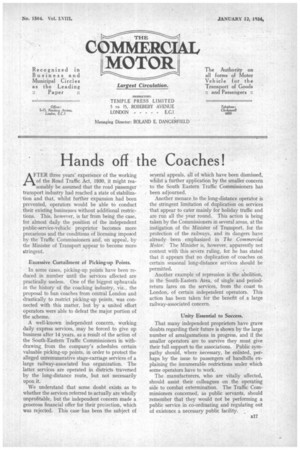Hands off the Coaches!
Page 35

If you've noticed an error in this article please click here to report it so we can fix it.
AFTER three years' experience of the working of the Road Traffic Act, 1930, it might reasonably be assumed that the road passenger transport industry had reached a state of stabilization and that, whilst further expansion had been prevented, operators would be able to conduct their existing businesses without additional restrictions. This, however, is far from being the case, for almost daily the position of the independent public-service-vehicle proprietor becomes more precarious and the conditions of licensing impmed by the Traffic Commissioners and, on appeal, by the Minister of Transport appear to become more stringent.
Excessive Curtailment of Picking-up Points.
In some cases, picking-up points have been reduced in number until the services affected are practically useless. One of the biggest upheavals in the history of the coaching industry, viz., the proposal to ban coaches from central London and drastically to restrict picking-up points, was connected with this matter, but by a united effort operators were able to defeat the major portion of the scheme.
A well-known independent concern, working daily express services, may be forced to give up business after 14 years, as a result of the action of the South-Eastern Traffic Commissioners in withdrawing from the company's schedules certain valuable picking-up points, in order to protect the alleged unremu.nerative stage-carriage services of a large railway-associated bus organization. The latter services are operated in districts traversed by the long-distance route, but not necessarily upon it.
We understand that some doubt exists as to whether the services referred to actually are wholly unprofitable, but the independent concern made a generous financial offer for their pro lection, which was rejected. This case has been the subject of seyeral appeals, all of which have been dismissed, whilst a further application by the smaller concern to the South Eastern Traffic Commissioners has been adjourned.
Another menace to the long-distance operator is the stringent limitation of duplication on services that appear to cater mainly for holiday traffic and are run all the year round. This action is being taken by the Commissioners in several areas, at the instigation of the Minister of Transport, for the protection of the railways, and its dangers have already been emphasized in The Commercial Motor.' The Minister is, however, apparently not content with this severe ruling, for he has stated that it appears that no duplication of "coaches on certain seasonal long-distance services should be permitted.
Another example of repression is the abolition, in the South-Eastern Area, of single and periodreturn fares on the services, from the coast to London, of certain independent operators. This action has been taken for the benefit of a large railway-associated concern.
Unity Essential to Success.
That many independent proprietors have grave doubts regarding their future is shown by the large number of amalgamations in progress, and if the smaller operators are to survive they must give their full support to the associations. Public sympathy should, where necessary, be enlisted, perhaps by the issue to passengers of handbills explaining the innumerable restrictions under which some operators have to work.
The manufacturers, who are vitally affected, should assist their colleagues on the operating side to combat extermination. The Traffic Commissioners concerned, as public servants, should remember that they would not be performing a public service in co-ordinating and regulating out of existence a necessary public facility. _




































































































